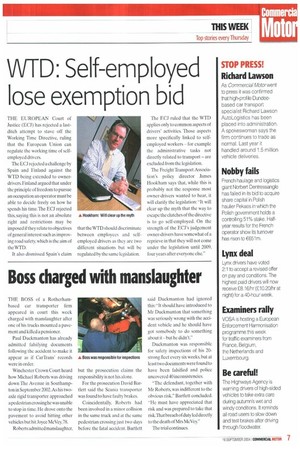WM: Self-employed lose exemption bid
Page 7

If you've noticed an error in this article please click here to report it so we can fix it.
THE EUROPEAN Court of Justice (ED) has rejected a lastditch attempt to stave off the Working Time Directive, ruling that the European Union can regulate the working time of selfemployed drivers.
The ECJ rejected a challenge by • Spain and Finland against the WTD being extended to ownerdrivers. Finland argued that under the principle of freedom to pursue an occupation an operator must be able to decide freely on how he spends his time. The ECJ rejected this, saying this is not an absolute right and restrictions may be imposed if they relate to objectives of general interest such as improving road safety. which is the aim of the WTD.
It also dismissed Spain's claim that the WTD should discriminate between employees and selfemployed drivers as they are two different situations but will be regulated by the same legislation. The ECJ ruled that the WTD applies only to common aspects of drivers' activities. Those aspects more specifically linked to selfemployed workers for example the administrative tasks not directly related to transport are excluded from the legislation.
The Freight Transport Association's policy director James Hook ham says that, while this is probably not the response most owner-drivers wanted to hear, it will clarify the legislation: -IL will clear up the myth that the way to escape the clutches of the directive is to go self-employed. On the strength of the ECJ's judgement owner-drivers have somewhat of a reprieve in that they will not come under the legislation until 2009. four years after everyone else."






































































































































































































